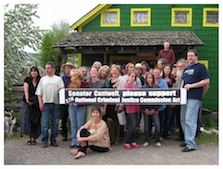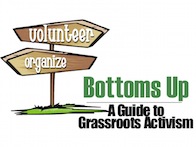Federal Sentencing, Policing, and Drug Policy Bills in the 112th Congress
Bill summaries below include links to the online congressional resource pages at Thomas.gov where you can find daily, up-to-date information.
In the House of Representatives
HR 223 - Nonviolent Offender Relief Act
Rep Jackson Lee, Sheila [TX-18] (introduced 1/7/2011)
Federal Prison Bureau Nonviolent Offender Relief Act of 2011 - Amends the federal criminal code to direct the Bureau of Prisons, pursuant to a good time policy, to release a prisoner who has served one half or more of his or her term of imprisonment if that prisoner: (1) has attained age 45; (2) has never been convicted of a crime of violence; and (3) has not engaged in any violation, involving violent conduct, of institutional disciplinary regulations.
You can follow this, and related bills by visiting this link at Thomas.gov
Federal Prison Bureau Nonviolent Offender Relief Act of 2011 - Amends the federal criminal code to direct the Bureau of Prisons, pursuant to a good time policy, to release a prisoner who has served one half or more of his or her term of imprisonment if that prisoner: (1) has attained age 45; (2) has never been convicted of a crime of violence; and (3) has not engaged in any violation, involving violent conduct, of institutional disciplinary regulations.
You can follow this, and related bills by visiting this link at Thomas.gov
In the Senate
S 306 - National Criminal Justice Commission Act
Sponsor: Sen Webb, Jim [VA], introduced 2/8/2011
SUMMARY AS OF: 2/8/2011
National Criminal Justice Commission Act of 2011 - Establishes the National Criminal Justice Commission.
Directs the Commission to: (1) review all areas of the criminal justice system, including federal, state, local, and tribal governments' criminal justice costs, practices, and policies; (2) make findings regarding such review and recommendations for changes to prevent, deter, and reduce crime and violence, reduce recidivism, improve cost-effectiveness, and ensure the interests of justice at every step of the criminal justice system; (3) consult with government and nongovernment leaders, including the United States Sentencing Commission; and (4) submit a final report on its findings, conclusions, and recommendations to Congress, the President, and state, local, and tribal governments and make such report available to the public. Expresses the sense of Congress that the Commission should work toward unanimously supported findings and recommendations.
SUMMARY AS OF: 2/8/2011
National Criminal Justice Commission Act of 2011 - Establishes the National Criminal Justice Commission.
Directs the Commission to: (1) review all areas of the criminal justice system, including federal, state, local, and tribal governments' criminal justice costs, practices, and policies; (2) make findings regarding such review and recommendations for changes to prevent, deter, and reduce crime and violence, reduce recidivism, improve cost-effectiveness, and ensure the interests of justice at every step of the criminal justice system; (3) consult with government and nongovernment leaders, including the United States Sentencing Commission; and (4) submit a final report on its findings, conclusions, and recommendations to Congress, the President, and state, local, and tribal governments and make such report available to the public. Expresses the sense of Congress that the Commission should work toward unanimously supported findings and recommendations.
S. 1231 - Second Chance Reauthorization Act of 2011
The Second Chance Reauthorization Act of 2011 (S. 1231) was introduced in June by Senator Patrick Leahy (D- VT), Chairman of the Senate Judiciary Committee, and Senator Robert Portman (R-OH), and you can contact your members of Congress and lend your support!
The bill would add 7 days to good-time (making that 54 days, instead of 47 a year) and add 60 days a year to people in prison who have taken advantage of programs that reduce recidivism.
More About Congress
How Laws are Made and Changed
A draft of a 'Bill' (proposed legislation in either the House of Representatives or the Senate) can originate from a variety of sources. Primary among these is the idea and draft conceived by a Congressional Member or Delegate, and the 'Executive Communication', usually in the form of a memo from the U.S. President or members of his cabinet. In addition, a Member's constituents, either individually or as a citizen group, may offer proposed legislation. Once a Bill is introduced, it winds its way through the U.S. Congress. This chart might help you understand the process.
For a more detailed analysis, download How Laws Are Made, by Charles W. Johnson, Parliamentarian of the US House of Representatives.
If you have children that want and need to understand the Legislative process, and if you are forming a family group, you'll have children that take interest in government, Uncle Sam has created a website geared for children. The menu at the bottom has age appropriate choices, we are going to start here with a great, and easy to understand explanation.
If you want to study the process in-depth, the Congressional Library has a veritable library to teach you all about federal government.
Passing laws is a complicated process. We hoped this helped you.
For a more detailed analysis, download How Laws Are Made, by Charles W. Johnson, Parliamentarian of the US House of Representatives.
If you have children that want and need to understand the Legislative process, and if you are forming a family group, you'll have children that take interest in government, Uncle Sam has created a website geared for children. The menu at the bottom has age appropriate choices, we are going to start here with a great, and easy to understand explanation.
If you want to study the process in-depth, the Congressional Library has a veritable library to teach you all about federal government.
Passing laws is a complicated process. We hoped this helped you.
Contacting members of Congress and local leadership
Set aside at least part of one day each month to write your local, state and federal elected officials. It may feel futile, but with public dissent rapidly mounting, personal letters become more important. Ask friends and family members to join you.
When a legislator responds, answer the letter. If s/he does not address your concerns adequately, pose the concerns again. If you get a positive response, thank the lawmaker in reply. To find your elected representatives, enter your zip code at Vote Smart.
To find names and contact information of your local elected officials look up your Town Hall's website, your city, and/or county websites.
Invite friends and family members over for a potluck and letter-writing party! Together, compose a letter that gets approved and signed with each person's contact information included.
Legislators of every level should respond and share their views. Figuring out where your elected leaders stand is done easily by writing them.
Watch for hearings and meetings that propose new prisons or jails, or “new” sentencing laws and policing matters. Attend meeting or hearings to voice opposition to more prisons, harsher sentencing laws, or ineffective policing. Sometimes these meetings are appropriate gatherings for local activists to wear their slogan T-shirts and distribute literature.
To learn more about grassroots organizing visit November Coalition's guide at Bottoms Up. It's free!
When a legislator responds, answer the letter. If s/he does not address your concerns adequately, pose the concerns again. If you get a positive response, thank the lawmaker in reply. To find your elected representatives, enter your zip code at Vote Smart.
To find names and contact information of your local elected officials look up your Town Hall's website, your city, and/or county websites.
Invite friends and family members over for a potluck and letter-writing party! Together, compose a letter that gets approved and signed with each person's contact information included.
Legislators of every level should respond and share their views. Figuring out where your elected leaders stand is done easily by writing them.
Watch for hearings and meetings that propose new prisons or jails, or “new” sentencing laws and policing matters. Attend meeting or hearings to voice opposition to more prisons, harsher sentencing laws, or ineffective policing. Sometimes these meetings are appropriate gatherings for local activists to wear their slogan T-shirts and distribute literature.
To learn more about grassroots organizing visit November Coalition's guide at Bottoms Up. It's free!






